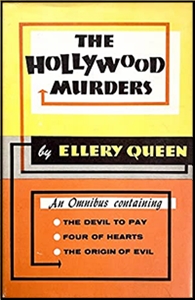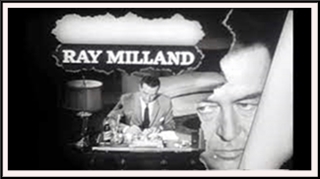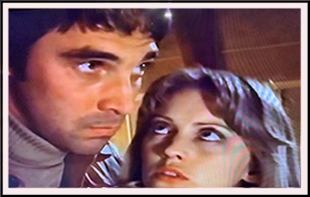February 2022
Monthly Archive
Mon 28 Feb 2022
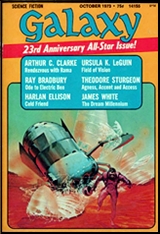
HARLAN ELLISON “Cold Friend.†First published in Galaxy SF, October 1973. Reprinted in The Best from Galaxy, Volume II, edited anonymously by Ejler Jakobsson. Collected in Approaching Oblivion: Road Signs on the Treadmill Toward Tomorrow (Walker, hardcover, 1974).
A man who has died on cancer wakes up and finds that except for a chunk of land surrounding the hospital in Hanover, New Hampshire, perhaps only three blocks in radius, the rest of the world has disappeared. Electricity is still on, and food is always stocked in the stores. At the edge of his world, things dangle from underneath, cables, water linesand the like.
He is the only one there, except at first strange barbarians from all eras from Earth’s past, who ride through then vanish over the edge. Until, finally, a young girl from Boston shows up. She is very pale and is wearing only a translucent dress. She is also very cold to the touch. She claims to have been responsible for the situation they are in, but Eugene Harrison (that’s his name), is not so sure.
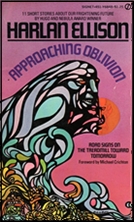
There is a little more to the story, but not a lot. (I have glossed over the finer details.) Readers who want solid endings to their reading matter may not like this one, but it’s told in such a way, — as if Eugene Harrison is telling us his story in words an ordinary person would use (or if Harlan Ellison, in proxy, was leaving an audio recording for us to listen to) — you may not mind at all either.
PostScript: You may be able to discern from the cover of Galaxy SF above that this was a special issue, the 23rd Anniversary issue, with quite a few name authors in it. If I’d bought this issue from the newsstand, and I probably did, I might have been disappointed. One chunk of 50 pages is the first part of a serial by James White (“The Dream Millenniumâ€), and another chunk of almost 70 pages is the end of a serial by Arthur C. Clarke (“Rendezvous with Ramaâ€).
That’s 120 pages of a 180 page magazine. This leaves space for only a one page poem by Ray Bradbury, and three short stories. The other two are by Theodore Sturgeon and Ursula K. LeGuin. If you skip the serial installments, that’s not a lot of reading for 75 cents.
Sun 27 Feb 2022
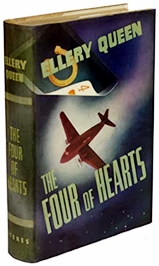
ELLERY QUEEN – The Four of Hearts. Stokes, hardcover, 1938. Pocket Books #245, paperback, 1943. Reprinted many times, including as one of the three novels in the omnibus volume The Hollywood Murders (J. B. Lippincott, hardcover, 1951).
The producer, not quite as eccentric as previously pictured (*) puts Ellery to work on a screenplay of the life stories of a famous actress and as equally famous actor. When they decide to patch up their feud which kept them apart for thirty years and finally marry, they are poisoned during their honeymoon flight. Ellery tried to keep the son and daughter apart but fails. The murderer plunges to his death as he tries to stop their wedding too.
An interesting interpretation of Hollywood types, and not only includes the two wild Hollywood weddings, but the double funeral is also extravagantly Hollywood. Ellery falls in love with Paula Paris, a columnist who will not leave her home, but who is able to provide him with clues to solve the case.
Good detection, a nicely complicated plot, with lots of detection and, even more, a book that’s fun to read — one of EQ’s best.
Rating: *****
–Nov-Dec 1967
(*) I assume but am not sure that this refers to the same producer Ellery worked for in The Devil to Pay, the previous “Hollywood” mystery and reviewed here.
Sat 26 Feb 2022
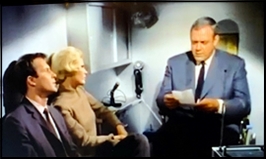
IRONSIDE. “The Leaf in the Forest.†NBC, 21 September 1967 (Season One, Episode Two). Raymond Burr (Robert T. Ironside), Don Galloway (Det. Sgt. Ed Brown), Barbara Anderson (Officer Eve Whitfield), Don Mitchell (Mark Sanger). Guest Cast: John Larch, Edward Andrews, Barbara Barrie, John Rubinstein, Bert Freed. Director: Leo Penn. Currently available online.
The basic setup for the series was established, in a TV movie entitled Ironside (March 28, 1967), but I’ve not seen that since it first aired, so I can’t provide any details beyond the following: Robert Ironside was a member of San Francisco Police Department until was crippled in an accident and confined to a wheelchair. Not wanting his expertise go to waste, he was hired as a consultant and given two liaison officers (Eve Whitfield and Ed Brown) to work for him, along with a personal driver (of a custom-fitted armored car).
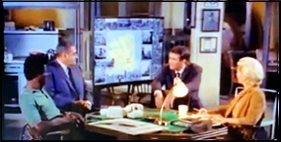
The title of this episode comes from an old “Persian†saying along the lines of “The best place to hide a book is in a library, to hide a man is in a city, and to hide a leaf is in a forest.†Ironside quotes this to his crew when the death of an old woman in her apartment appears to be the sixth victim of a serial killer menacing the serial. The m.o. appears to be the same, but Ironside sees some crucial differences.
Raymond Burr was of course fresh from a long run as TV’s Perry Mason, and his popularity easily continued on to this series, which lasted eight seasons. As Robert Ironside, he was extremely observant and made an obvious effort to push his assistants to think the way he did, and not much succeeding, at least in this episode. Perhaps they got better.
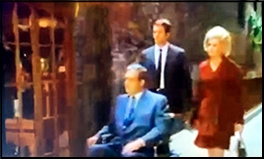
In any case, by challenging them with the clues, he was doing the same for the benefit of the viewer, but without calling the members of his TV audience “children,†as he does on a couple of occasions, with some exasperation.
All in all, it’s a fairly easy case to solve, but it’s fun to see the cast as they start to come to grips with their roles. Of the guest stars, Barbara Barrie stood out way ahead of the others, as a wife faced with the hard decision to give her husband [PLOT WARNING!] an alibi for the killing or not.
Sat 26 Feb 2022
Posted by Steve under
Reviews[3] Comments
REVIEWED BY DAVID VINEYARD:
MORRIS WEST – Summer of the Red Wolf. Morrow, hardcover, 1971. Pocket, paperback, 1972.
Suddenly I was sick of the savagery of the world.
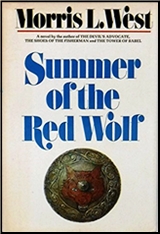
The unnamed narrator of Summer of the Red Wolf is a writer facing the most extreme kind of ennui. He is fed up with civilization, sick of the world; “I was engulfed in black despair.â€
“The world would not stop for me. I could only jump off of it into a dubious eternity.â€
Maybe it is fate he meets Alistair Morrison. Morrison is one of those fictional deus ex machina the hero of this kind of book encounters at just the right moment, a semi-mystical philosopher/gadfly who plunges our narrator into a life devoid of all the pretense of civilization.
“Sometimes a man falls sick of the sunlight itself. He sees everything so clearly he becomes blind…It’s time to go then. Time to stick a shell in his hat, pick up the Pilgrim staff and take the road.â€
“What road?â€
“To the place of unknowing.â€
For our hero the “place of unknowing†is beyond the isle of Skye, “and may Saint Donan be between you and harm.â€
On the way to his remote fate our hero meets Dr. Kathleen McNeil, a dark haired long legged Scot he will soon fall in love with, and the man who will change his life, Red Ruarri Matheson, master of the ship Mactire (Celtic for wolf), a bearded Viking of a man, “…he had the watchful sidelong glance of the commando,†a dangerous man, a gun runner, and more, friend, enemy, antagonist, and killer. Ruarri the Mactire.
“Women I love. Money I love. Horses I can take or leave, like oysters. And for the Irish and their squabbles, I don’t give a hoot in hell.”
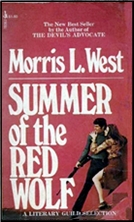
The writer, who Rurarri calls sennachie, or storyteller, sees himself in the shadow of the Red Wolf, but unconsciously matches him as an adventurer. This is the classic form of the adventure novel, David Balfour meeting Alan Breck, Jim Hawkins first encountering Long John Silver, the narrator of The Third Man meeting Harry Lime, Marlow and Kurtz, the opposites that not only attract, but that are strangely mirror images…
Morris L. West cut his teeth writing adventure fiction and thrillers in his native Australia before he turned to bestseller-dom with books like The Daughters of Silence, The Ambassador, and eventually The Shoes of the Fisherman, Harlequin, The Navigator, and The Salamander. Eventually Hollywood came calling too with movies and mini-series and his works topped the New York Times Bestseller List regularly.
Eventually Red Ruarri, wild Ruarri, Ruarri the Red Wolf goes too far and the sennachie has to challenge him, a demonstration of fencing with a saber with Ruarri out to do real harm, and the narrator recognizing he can only save himself and Ruarri by besting him.
There is murder at the heart of the story, and a surprising twist in the dynamic between the man of letters and the man of action that comes at the books emotional climax.
This is Buchan and Stevenson country with hints of Conrad’s complexity and depth, a kind of poetry of adventure and far places on the edge of civilization as most of us know it. It is the poetry of the wild wet wind off the sea, of rocky coasts, and ice driven breezes, of life lived at a different pace closer perhaps to the both the elements and the ever present shadow of death. West was the most literary of the major bestselling writers of his time and something more than just a name on the bestseller list, and this, I suspect, his most personal novel.
They were very old men and they must have seen many departures and many dyings and all the griefs of the sea over the years: but they were still here, working the same simple task, glad of the sun while it lasted, and glad of the warm foggy bar, when it wasn’t. For them life was its own absolution, and time brought its own healing, sooner or late. I was no better than they and certainly no wiser; so why should I ask for more? It was time to be up and doing and to hell with yesterday…
If it is not great literature it is a kind of literary experience that I have always savored, and will, I hope continue to for as long as I read and write. Those “places of unknowing†call the armchair adventurer in all of us, and to be fair it is a damn site more comfortable than the actual icy blast of the North Sea and the wind rattling the shutters as the wild thunder rolls and heavy waves erode the shore.
Summer of the Red Wolf is as good a choice to curl up in a good chair with a snoring cat in your lap or dog beside you, a glass of good whiskey at hand. and settle in for a long read as I can imagine, and for me that in itself may be my highest recommendation. The Sennachie and Ruarri the Mactire will linger in your imagination long after you have turned the last page and laid the book aside.
Fri 25 Feb 2022
REVIEWED BY DAN STUMPF:
WATERLOO ROAD. Gainsborough, UK, 1945. John Mills, Stewart Granger, Alastair Sim, Joy Shelton, and Alison Leggatt. Written & directed by Sidney Gilliat. Currently available on YouTube.
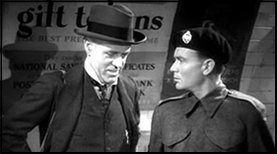
Sidney Gilliat’s credits include thrillers like The Lady Vanishes, Bulldog Jack, Night Train to Munich, The Green Man and many others, so with him at the helm this promises to be a witty, fast-paced and suspenseful yarn. It doesn’t disappoint. Waterloo Road (set in 1941 at the height of the Blitz) crackles with movement and tension, even though there’s very little actual criminal activity, mostly done by the hero of the piece.
Said hero is Private Jim Colton, ably played by John Mills in his usual unassuming way, albeit a bit handier with his fists than usual. When Colton hears that his wife Tillie (Joy Shelton) has been running around with spiv Ted Purvis (a slick job by rising star Stewart Granger) he goes AWOL in London to check things out for himself.
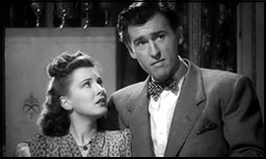
That’s not a terribly promising start for a thriller, but Gilliat fills the slender tale with fast-paced foot chases as Colton eludes the MPs, tense encounters with Purvis’ thuggish associates, and he backs it up with some colorful smaller parts, ably written and played: Alastair Sim fits in quite suitably as the moral anchor of the tale, and Joy Shelton conveys the complexity of a lonely woman missing her husband and sorely tempted by Granger’s patently phony charm as Gilliat cross-cuts neatly between Colton’s search for Purvis and Purvis’ simultaneous moves on the Missus, each building suspense in its own way. And when the pay-off scene finally arrives it’s handled perfectly, with the most savage fight scene in British Cinema until Sean Connery and Robert Shaw went at it in From Russia with Love.
Oddly though, what stays in the mind is the emotional resonance of the moment, as feelings are conveyed by a glance, hearts broken and mended with a meaningful gesture, and Colton’s fury is unleashed not by Purvis’s attempted seduction, but when the rejected spiv insults his wife. The delicate emotional balance lends dramatic contrast to the violence that ensues, and the result is one of those truly memorable movie moments in a film well worth seeking out.
Thu 24 Feb 2022
Posted by Steve under
Reviews[11] Comments
REVIEWED BY TONY BAER:
JAMES M. CAIN – Serenade. Alfred A. Knopf, hardcover, 1937. US Paperback editions include: Penguin Books #621, 1947; Signet 1153, 1954; Bantam S-3864, 1968; Vintage, 1978. Film: Warner Brothers, 1956, with Mario Lanza and Joan Fontaine.
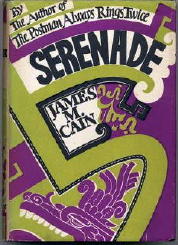
First person narrative of a self-hating, closeted, gay opera singer. He falls in love with a rich gay conductor in Europe but feels so guilty about his homosexuality he has a nervous breakdown and can no longer sing worth a damn.
He runs away.
Relegated to the worst opera circuit in the world, in Acapulco, he quits and finds himself with his last three pesos, drunk, in a slummy bar.
A really hot prostitute walks in and fawns on a local hero bullfighter.
The gay opera guy feels something in his libido awaken in the presence of the prostitute.
So he gives the bullfighter the staredown. The bullfighter comes up to him and asks what his problem is. Mr. Closet says: let’s gamble for the girl. They do. Mr. Closet loses a fixed lottery game.
The prostitute drops him her address, and he looks her up.
He gets drunk with her at her little whorehouse, and it looks like things are going swell, when he sings her a gay serenade.

She senses the homosexual tendencies in his castrato, and cuts him off (figuratively–not Bobbit-like), and he trudges on home.
A week later she wins a little lottery money and seeks him out—thinking a gay dude would be the perfect pimp for a whorehouse she wants to start up in Mexico City with her ‘seed money’.
En route to Mexico city in a little red convertible ford they hit a massive thunderstorm. The roads flood. There’s nowhere to go. They come to a church. The church door is locked. So he rams the car thru the locked church doors and they wait out the storm.
They’re soaked so they take off their clothes.
Aroused by her naked figure praying at the alter asking forgiveness, he rapes her.
Enraptured by his hetero rapist cajones, he turns to the window and sings opera with a depth, vigor and confidence he’d never known. His voice was back and better than ever.
For some reason, the whore now loves him. He’s shown her he’s a ‘real man’ or something.
He takes her back to the States with him, and becomes a huge Hollywood star. Then he leaves Hollywood and becomes a huge opera star with the Met.
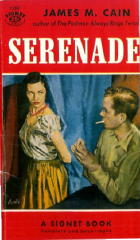
Then disaster strikes as his old beau, the rich gay conductor, tracks him down, stalks him, pulls him back into his orbit.
Things come to head when the old beau calls immigration on the prostitute. She waves her cape like a toreador, and she sticks him like a bull.
Things get pretty crazy from there as our protagonist can’t quit her. He finds himself falling for another man. He can’t believe it–‘I’m not one of those….am I?’. He feels that she’s his only hope to save him from his own gay lust.
But the warrant’s out for her, murder one. He can’t let her get the chair.
He’s gotten so famous he can no longer sing, lest he risk the whore whose musk summons hetero urges to his lust.
As ridiculous as it all sounds, the book is really great. Mexico is palpably rendered. And Cain really knows opera. The dialogue is as good as anything Cain ever wrote. Which says a lot. Since Cain is as good as any hardboiled writer. And for me, that means he’s as good as anybody. Ever.
So if you can let go of the bizarre self-hating gay machismo of a bygone era, and accept the fact that bizarre self-hating gay machismo is and was a real thing, as worthy of acknowledgement as dinosaurs, dead stars and moonbeams, then have yourself a treat and check it out. It’s really good.
Previously reviewed here by Max Allen Collins. The film panned here by David Vineyard.
Thu 24 Feb 2022
Posted by Steve under
Reviews[3] Comments
HENRY KANE. “Suicide Is Scandalous.†Novelette. Peter Chambers. First appeared in Esquire, June 1948. Collected in Report for a Corpse (Simon & Schuster, 1948). Reprinted in The Mammoth Book of Private Eye Stories, edited by Bill Pronzini and Martin H. Greenberg (Carrol & Graf, 1988).

It’s only my opinion – I have no stats to back this up – but as an author of any number of crime novels, and in particular, the creator of New York City-based PI Peter Chamber, Henry Kane has largely been forgotten in recent years. One exception is, of course, Mike Nevins’ covered his early years in one of the monthly columns he does for this blog. One of the stories covered, in fact, is this very one. Go here.
This is one of the longest excerpts I’ve ever inflicted upon readers of this blog. Bear with me. A little old lady is sitting in Peter Chambers’ office on the other side of his desk. Bear with me. Here goes:
She put the handkerchief away. “The Lieutenant sent us.”
“What Lieutenant?”
“The man downtown. The Detective-lieutenant.”
“Parker?”
“Yes, sir. Lieutenant Parker.”
“A real policeman.”
“A fine, good man.”
“The best.”
“He said this was where to throw it.”
“I beg your pardon.”
“That’s what he said.”
“Throw what?”
“My money. That is, if I insisted on throwing it away.”
“I beg your pardon.”
The smile came back, very tired among the faint wrinkles on her face, and it did something to you, no matter you’re a cynical wiseguy private richard battened down behind a desk over which too much evil has spewed. It got to you, in a corner inside of you, like “Stardust” on strings in a sawdust saloon after a good many brandies. I grunted.
“How much?”
Her eyebrows peaked. “How much?”
“How much do you insist on throwing away?”
“Oh. He said you were expensive. He also said you were a crook.”
“Look, lady– ”
“He was joking, of course. A thousand dollars, perhaps fifteen hundred … ”
“Oh.” Good-bye Stardust, because business is business, and you have got to have the pretzels for your beer. On the other side of the. desk sits your sucker — always; they wouldn’t be on the other side of that desk if they didn’t need you badly. Either you squeeze them, or they squeeze you: you learn that early, Always, on one side of the desk sits a sucker. Could be me.
“Two thousand,” I said.
Now either you find that an extraordinarily fine piece of writing, or you don’t. Kane’s prose, at least in this story, I’d place on the spectrum somewhere between Raymond Chandler and the Dan Turner stories by Robert Leslie Bellem, but closer to Chandler than the out-and-out wackiness of a Dan Turner story:
“Don’t know nothing from absolutely nothing.” He put a wide hand on my chest and he shoved with relish and sharp determination, and the door slapped shut in my face. Mr. Gino Stark got filed away as a handsome young man with a tough-guy complex that needed treatment. Something psychiatric. Like a haymaker.
I took a cab, still rankling along the chest and rumbling around the stomach and trying to engage reasons for administering the treatment for our Gino’s complex, all of which is good for the passage of time, because before I knew it I was paying off the hackie in front of Two Ninety Park.
I pushed my hat back and I looked up at the narrow four sandstone stories of a very svelte little pigmy amongst the flat-faced monsters that go to make up our canyon of Park. No doorman. No nothing. Just a silver-grilled ninon-backed glass door with an ivory boundary and a horse’s head for a phony knocker and a shining lock. I stuck the key in that Williams had given me and I was in a hallway with enough plush for a lupanar, and a curlicue stairway. Very dandy, but a walk-up, nevertheless. Ah, me, and the rasp of a sigh: your detective trudged, grudgingly, bending over to study nameplates. On the second floor front it said BENTLEY.
So, OK. What’s the story about? Chambers’ client, the little old lady from the first except above, does not believe her daughter committed suicide. The police are convinced; that’s why she’s hired Chambers. But besides suicide being scandalous, there is a small matter of a will. The dead girl was rich. Her will leaves half to her mother, half to her sister. If it was murder, and the sister did it, who gets all the money?
Besides being an above average PI story in and of itself, “Suicide Is Scandalous†ends with a lot of detective work going on. There was, in fact, so much detective work going on that I found it confusing. Oh well. You can’t have everything.
Wed 23 Feb 2022
Posted by Steve under
Reviews[2] Comments
REVIEWED BY BARRY GARDNER:
K. C. CONSTANTINE – Good Sons. Rocksburg [not Mario Balzic] #12. Mysterious Press, hardcover, 1996; paperback, 1997.

I had heard Constantine was calling it quits, but not so. Not only do we have this, but a Reliable Source tells me that there will be another Balzic to follow it. I also thought Constantine had said everything he had to say (and repeated a damned good portion of it), but I guess not-either that, or he needed the money.
Detective Sergeant Ruggiero (“Ruggs”) Carlucci is more or less in charge of the Rocksburg, Pennsylvania police department since the retirement of Mario Balzic, and he thinks/is afraid that he may be in line for the Chief’s job. He’s got a lot of internal and external problems, and isn’t sure he wants it. His mind gets focused on another set of problems when a woman is found at a local business, horribly raped and mortally battered. The case will tell him a lot about himself, and what he can and wants to do and be.
First, let me say that this is more of a mystery/crime novel than either of his last two books have been, not that it would take much more than a bigtime case of jaywalking to make that true. Carlucci isn’t as appealing a character to me as Balzac; I guess his problems don’t match up well enough with my own for me to relate well to his.
I really don’t relate to Constantine at all any more, though on the basis of his earlier work I’m more than willing to concede that he’s earned his reputation. He preaches and speeches too much for me now, and though his blue-collar Everymen-and-women may be realistic, they just don’t interest me that much.
— Reprinted from Ah Sweet Mysteries #22, November 1995
Tue 22 Feb 2022
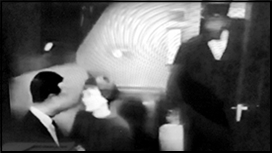
MARKHAM. “Coffin for Cinderella.†CBS, 04 February 1960 (Season 2, Episode 34.) Ray Milland (Roy Markham). Guest Cast: Gloria Talbott, J. Pat O’Malley. Screenwriter: Jonathan Latimer. Director: John Rich. Currently available on YouTube.
Oh, for the life of a private eye. Taking a business trip by train from New York to Florida, Markham is surprised by a young girl (Gloria Talbot) coming into his compartment with a porter and greeting him with a kiss and announcing herself as his wife. Maybe I don’t take trains often enough, but such a thing never happened to me, and if you were to tell me it’s happened to you, I wouldn’t believe you.

It turns out that (a) she’s just inherited $33,000,000, (b) someone’s tried to kill her in her bedroom while sleeping, (c) she’s on her way to stay with her uncle for safety, and (d) two men are following her. All good reasons for Markham to take her on as a client until he finds out who’s behind all this. It doesn’t hurt that this Cinderella heiress is also very attractive and just a little flirty.

Markham the TV show was on CBS for two seasons. Markham the character was one of those PI’s who are independently wealthy and could take (or turn down) cases at his own choosing. In spite of a well-known mystery writer coming up with this week’s story line, at only 30 minutes long, there aren’t enough characters to choose from as being the one behind the attacks on Markham’s client, and the crucial clue is truthfully a bit of a stretch.
On the other hand, I can always watch anything with Gloria Talbot in it (last seen by me in an episode of Conflict and reviewed here).
Mon 21 Feb 2022
REVIEWED BY DAVID VINEYARD:
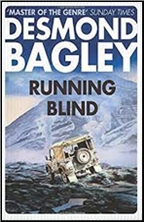
RUNNING BLIND. BBC Scotland, 1979. Stuart Wilson, Ragenheidur Stendor, George Sewell, Vladek Sheybal. Teleplay by Jack Gerson, based on the novel by Desmond Bagley. Directed by William Brayne.
This co-produced British and Icelandic television adaptation of Desmond Bagley’s thriller Running Blind, was originally released as a mini-series and re-released as a feature that appeared on PBS, and that is just about the last time anyone saw it until recently. To say it has been elusive is an understatement.
It’s now available on YouTube.
Alan Stewart (Stuart Wilson) a retired British (or as he insists, Scottish, he even carries a skean dubh, a Scottish dagger) agent for an unnamed department is approached by his old boss Slade (George Sewell) who once had Stewart execute a old friend turned suspected traitor. Stewart naturally wants nothing to do with Slade and the Department, but the job in question is in Iceland where Stewart’s girlfriend Elin (Ragenheidur Stendor) lives and is as simple as delivering a small package for a lot of money.
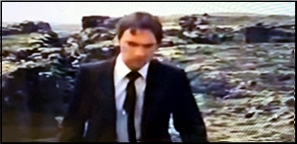
Slade also dangles that he might be more inclined to protect Stewart and Elin from the Russian masterspy Kennikin (Vladek Sheybal) who was emasculated by a missed shot Stewart made in attempting to kill him.
A little added incentive.
As you might imagine, nothing is that simple. Almost from the moment he sets foot on Icelandic soil, it becomes clear that the Russians are onto Stewart and that his own side is less than forthcoming.
Contacting Elin, who doesn’t suspect who or what Stewart is, he uses her to misdirect the men following him and finds he is on the run from both the Russians, the British, and soon the CIA.
Just what is he carrying, and who is on whose side?

Running Blind was one of Bagley’s best novels, and that’s quite a compliment for the South African actor turned thriller writer whose work includes High Citadel, The Vivero Letter, Freedom Trap (filmed as John Huston’s The MacIntosh Man), Tightrope Man, The Spoilers, Snow Tiger, and more.
Bagley would become a bestselling thriller writer whose work bridged the gap between the earlier generation of British thriller writers like Geoffrey Household, Hammond Innes, and Victor Canning, and the newer breed represented by Alistair MacLean, Gavin Lyall, and Duncan Kyle. He had Innes’ eye for detail, Household’s grasp of rough country, Lyall’s uncanny research skills, Canning’s cynical view of the Security Services and MacLean’s gift for twisting plot and hard action.
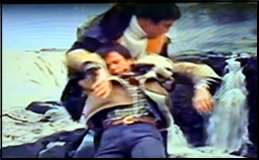
Unlike most writers of his era he almost never repeats himself, and his protagonists are distinct and easy to identify,
Action is the by-word of the print version of Running Blind, and it is perhaps only natural that the mini-series format is a poor one to convey that. Though the structure of the film is close to the book, the first third seems mostly Stewart looking over his shoulder against the rather bleak Icelandic volcanic landscape, and the lack of directorial style and a good score means everything depends on the actors and the scenery, and both are almost good enough to carry it, particularly Wilson.
About a third of the way through things pick up considerably, and if you will keep tuned in until the point when Stewart and Elin are stalked by an assassin with a high powered rifle while camped out, you will probably stay for the entire story which falls in the category of films that seem much better in retrospect than while you are trying to get into them.

That change is notable. The scenery becomes more dramatic, the action comes faster, the suspense is greater, and the twists come more frequently.
Running Blind is not a completely successful translation of Bagley’s fast paced hard pounding novel, but it is entertaining if you stick through a slow first third. Valdek Sheybal (From Russia With Love, Billion Dollar Brain, The Wind and the Lion, and on television in mini series like QB VII and Shogun) picks things up considerably playing the KGB spy master Kenniken with a mix of suave professionalism and barely disguised fury at Stewart. That tension between the complete professional and the angry man gives the quiet scenes between him and Stewart real (and much needed) power.
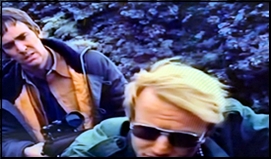
Most of the cast is unfamiliar, or at best faces you have seen but don’t really connect a name with. Lead Stuart Wilson is much more familiar now than his younger face in films like The Mask of Zorro, Hot Fuzz, Lethal Weapon 3, and Enemy of the State and on television in Dinotopia, MI-5, and Prime Suspect. More often than not today he plays a bearded villain not unlike Sheybal in this.
Running Blind is mostly a curiosity. If you have read or enjoyed Bagley’s fine novels this is a bit more, but I admit it isn’t fully successful and it’s a book that deserves a big action movie done right and not a small half-hearted mini-series.
I can see where they saw the minimal sets and Icelandic setting and thought they could get away with it, they just don’t quite pull it off, though I like it more than it probably deserves. The chance you might too makes it worth investigating.
Next Page »



